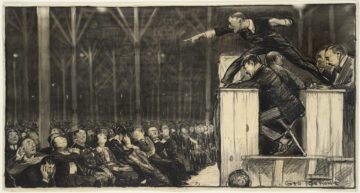by Tim Sommers

Moral Grandstanding is using moral talk as way of drawing attention to oneself, seeking status, and/or trying to impress others with our moral qualities. Moral grandstanding is supposed, by some, to be a pervasive and dangerous phenomenon. According to psychologist Joshua Grubbs, for example, moral grandstanding exacerbated the COVID-19 crisis and is “part of the reason so many of us are so awful to each other so much of the time.”
Moral grandstanding is intimately related to virtue signaling, and both are, let’s face it, first and foremost internet problems – if they are problems at all. Since virtue signaling came first, it actually has a dictionary definition. The Cambridge Dictionary defines virtue signaling as “An attempt to show other people that you are a good person, for example by expressing opinions that will be acceptable to them, especially on social media.”
What’s the difference, then, between virtue signaling and moral grandstanding? Maybe, there isn’t one, or, maybe, it’s this. According to philosophers Brandon Warmke and Justin Tosi, the principal investigators on a multi-year Koch Foundation funded research program leading to their 2020 book, “Grandstanding: The Use and Abuse of Moral Talk,” grandstanding is about using “moral talk to dominate others”. So, virtue signaling is about fitting in, while moral grandstanding is about taking over. Read more »
